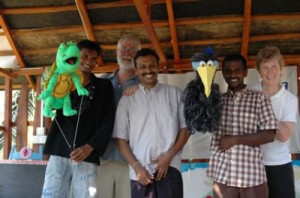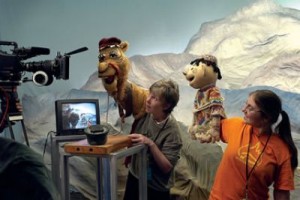No Strings Attached To Puppet Charity
 Bermuda’s Michael Frith and his Long Island-born wife Kathryn Mullen are continuing to broaden the scope of their international campaign to bring life-saving lessons to the world’s children through the magic of puppetry.
Bermuda’s Michael Frith and his Long Island-born wife Kathryn Mullen are continuing to broaden the scope of their international campaign to bring life-saving lessons to the world’s children through the magic of puppetry.
Their charity, No Strings, is now operating in Asia and throughout Africa after the success of inaugural anti-landmine campaign in Afghanistan in 2005. Mr. and Mrs. Frith — seen at left working on a tsunami-related children’s project in Sri Lanka – still spend part of the year at their Bermuda Salt Kettle home. But they can often be found in one of the world’s disaster areas or trouble-spots, introducing the puppet films they make in New York to very different audiences than the ones they used to entertain as key members of the Muppets team.
No Strings was the result of a chance meeting between the Bermudian couple and Irishman Johnie McGlade, who worked as an emergency aid coordinator for 12 years in numerous regions of the world affected by conflict or disaster.
Frequently, Mr. McGlade used an old rabbit puppet during his work after realising its remarkable appeal to children and adults, and its subsequent usefulness as a tool to communicate important messages and directions.
Mr. Frith and Ms Mullen had both worked at a very senior levels with Muppets creator Jim Henson at his production company Henson Associates. Mr. Frith was the designer and art director who co-created such iconic Muppet characters as Miss Piggy while Ms Mullen was a performer and voice artist: among many other credits, she was one of Yoda’s puppeteers on “The Empire Strikes Back” (1980). They both worked on ”The Muppets” TV series and movies as well as the Bermuda-inspired “Fraggle Rock” before helping to found the company which created the Emmy-winning PBS children’s series “Between The Lions”.
The couple were immediately intrigued by Mr. McGlade’s idea of using puppetry to communicate life-saving lessons in a culturally-informed manner.
“Kathy and Michael profoundly understood the educational value of puppets after decades of working in specialised children’s TV, and for a long time, had been thinking up ways to use their skills to support the well-being and safety of children in the Developing World,” said Mr. McGlade. ” At its simplest level, we’re a production company, making films according to the needs of local development organisations, part of whose mission it is is to teach children and other groups vital messages that will help protect them from danger or illnesses in the countries they work in. No Strings helps define those messages, we work with some of the best people in the industry to turn them into fun and exceptionally high quality puppet films, and we train facilitators from in-country partner organisations in special ways to deliver the films, so that audiences have maximum opportunity to absorb the learning points and consider their application to their own lives.
“With a profound understanding of the ability of puppets to engage children, teaching difficult messages while at the same time entertaining them, they had long sought to use their expertise to benefit young people in more troubled regions of the world. Why puppets? Puppets are able to deliver sensitive messages in a way that is non-threatening and non-judgemental. They are fun and, in the right hands, extraordinarily charming.”
No Strings first project
was a landmine-awareness film, ChucheQhalin, or the Story of the Little Carpet Boy”. Based loosely around the story of Pinocchio, Chuche has to learn how to get to school safely and avoid any danger before he can become a real boy. Afghanistan is one of the most heavily mined countries in the world, and the need for this sort of safety education, which not only presents messages very clearly, but actually grabs – and retains – busy children’s attention, will be paramount for many years to come.
 “ChucheQhalin” is being taken to schools and community groups in various parts of the country by No Strings’ local partner there, the Organisation for Mine Clearance and Afghan Rehabilitation, often using off-road eRanger cinema bikes, which have their own large screen, projector and generator
“ChucheQhalin” is being taken to schools and community groups in various parts of the country by No Strings’ local partner there, the Organisation for Mine Clearance and Afghan Rehabilitation, often using off-road eRanger cinema bikes, which have their own large screen, projector and generator
Since then No Strings has extended its operations to both Africa and Asia. In Kenya Uganda and Tanazania, where the HIV/AIDS virus continues to threaten the lives and health of untold numbers of children growing up in sub-Saharan Africa, a new new series of culturally appropriate films addresses three key issues in the effort to combat its spread: gender equality, stigma, and prevention.
In Sri Lanka, a year on from the devastating 2004 tsunami, children living on affected coastlines remained anxious and afraid of the sea. Many of them bereaved and traumatised, this anxiety added greatly to many of their troubles. No Strings created an interactive film and live puppet programme which takes children on a journey to the bottom of the ocean to meet the Great Grandfather Whale, the oldest and wisest of creatures who could explain why the tsunami happened. Understanding its cause, and equipped with information to recognise warning signs and how to get to safety, children felt empowered after watching the film, and less anxious about changes in weather patterns and other things they thought might cause a repeat disaster
 The world’s eyes were also on Indonesia in the aftermath of the 2004 tsunami. The region, including neighbouring East Timor, has suffered smaller tsunamis since then which have claimed many additional lives, and its population lives under the constant threat of earthquakes, floods and landslides, and, in certain regions, volcanoes. No String’s “Tales of Disaster” film series was launched there in late 2007, each focussing on a different natural cataclysm. Since then, the films have been taken to schools and community groups by the charity’s key local partners and have had a strong impact on how children and communities understand how to prepare for and keep safe during natural disasters. The region is also where No Strings launched its “Two Gardens” peace-building film which accompanies the series.
The world’s eyes were also on Indonesia in the aftermath of the 2004 tsunami. The region, including neighbouring East Timor, has suffered smaller tsunamis since then which have claimed many additional lives, and its population lives under the constant threat of earthquakes, floods and landslides, and, in certain regions, volcanoes. No String’s “Tales of Disaster” film series was launched there in late 2007, each focussing on a different natural cataclysm. Since then, the films have been taken to schools and community groups by the charity’s key local partners and have had a strong impact on how children and communities understand how to prepare for and keep safe during natural disasters. The region is also where No Strings launched its “Two Gardens” peace-building film which accompanies the series.
No Strings has also extended the reach of its natural disasters and peace-building series to the Philippines. Partners involved in the dissemination of the films include Save the Children, World Vision, Oxfam, Unicef, as well as the Filipino Department of Education, which has committed to incorporating the programme into its national curriculum in order to reach every elementary schoolchild in the country. The “Two Gardens” film is also being used around the country, particularly by interfaith organisations on the conflict-affected island of Mindanao.
Ms Mullen has said puppetry has the power to transcend all linguistic and cultural barriers — and can also communicate messages to those children who might not otherwise be equipped to hear them: “One of the problems is that in some places you have almost total illiteracy. So how do you get the word out, especially in areas where there is very little television and radio? You can’t send them pamphlets because they can’t read them.”
Her husband has said it’s vital the films they produce are meticulously researched so that characters, sets and storylines are culturally sensitive, appropriate, and instantly familiar to their audiences.
“How do you honour each and every culture?” Mr. Frith has said. “In a place like Indonesia there are something like 30 countries and so many religions and languages and ancient rivalries. The history is so deep and powerful that there is no way that a guy from Bermuda and a girl from Long Island are going to have the knowledge to pull it off. So we needed lots of help from people in those countries.”
For local relief workers hoping to improve awareness around issues like cyclone preparedness and safety, earthquakes or the stigmas linked to HIV, the films offer an invaluable teaching aid: a fun, visual tool that captures their group’s attention, and stimulates their imagination.
“Lessons become a treat, accessible to all regardless of reading and writing ability,” said a No Strings spokesman. “For many in that group, there may be an emotional resistance to confronting certain issues. No Strings films are a safe way in. They use puppets, rather than real people; characters that are easily associated with, but who are not off-putting. By tackling difficult subjects through entertainment, tough issues can be unpicked and destigmatised.
“Typically, films last between eight and 14 minutes, long enough to cover a range of key messages within an engaging storyline. After watching, children are encouraged to open up about their own world; their fears, anxieties, and how they might apply the learning points in the films to their personal circumstances, and then to share their learning with family members. No Strings films are highly versatile. Message content is pitched so that children from eight-to-12 will understand, but with appropriate facilitation, the films can be used with teenagers or mixed community groups to equal benefit.”
.
Read More About
Category: All, Entertainment

